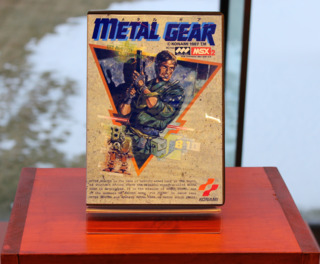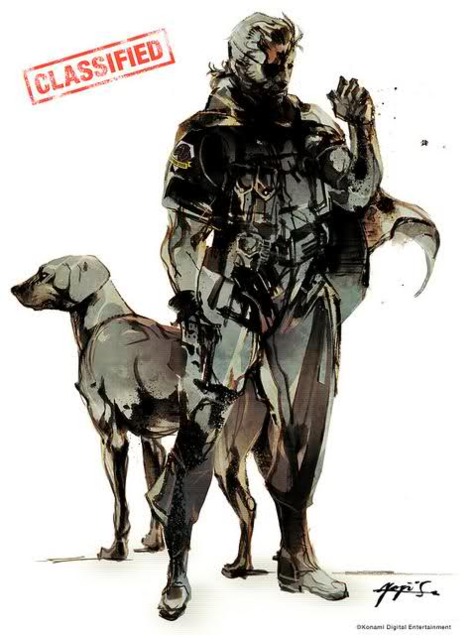There are many relevant video game series that began in the 1980s, but very few have retained their cachet as well as Metal Gear has. After 27 years, it seems as though interest in the legendary stealth series continues to grow, and though dozens of hands touch each game, including notable Metal Gear vets Yuji Korekado and Ken-ichiro Imaizumi, it's director Hideo Kojima and art director Yoji Shinkawa who are widely regarded as the head chefs in the kitchen. Without Hideo Kojima, who convinced Konami to support a stealth game during the golden age of hard-hitting, arcade-style action, Metal Gear wouldn't exist. Without Yoji Shinkawa coming on board for 1998's Metal Gear Solid, the series wouldn't enjoy the same impactful visual style that it's known for today.
I recently got the chance to speak with the pair during a visit to a Kojima Productions facility in Nasu, Japan, but before jumping into a discussion about Metal Gear Solid V, I couldn't help but wonder how they felt about a particular display set up in the corner of the room. Across three tables lay an enormous collection of Metal Gear games and paraphernalia, including the original MSX versions of Metal Gear and Metal Gear: Solid Snake, the first two Metal Gear games, which also happen to fall after Metal Gear Solid V in the series' sprawling storyline. The juxtaposition was hard to ignore. I'm at an event for the next-gen Metal Gear Solid game, and there's the original, 27-year-old game staring me in the face. No doubt Kojima and Shinkawa took a look as well. So I asked them: How does it feel to look back on nearly 30 years of Metal Gear games? Kojima hadn't only looked; he took the chance to go hands-on with the game that launched his career.

"Yesterday, I played the MSX version. That is my starting point, the first game I created, and I wanted to go back. So yesterday I actually sat down and played that MSX game, and it re-created the passion I had back then, and all of the feelings that I initially had when I started creating games. You know it's a game that you play with your keyboard, and I still remember when the controls were set up, the maps, the items. That gave me a lot of confidence, because today I cannot remember people's names. I was like, 'Yeah, maybe I can keep doing these things.' It gave me a lot of confidence."
As it turns out, Shinkawa is constantly revisiting old games for reference. Still, his past work, no matter how familiar, reminds him of the relationship between the artist and the work of art.
"Well, to be completely honest, all the time I look back at this stuff, especially when I recently re-created some figures from Metal Gear Solid. Or, for some illustration books, I have to go back and put everything together, so to be honest, it's not something that I haven't seen in a long time. That said, when I look at my old drawings, I always remember what I felt when I drew that, and that is very interesting for me. I remember what I was feeling when I created something very specific, and this is fun, honestly. Several times I look back and I know that I couldn't create something similar again. I like looking at the things that were very specific to that point in my life, that point in time, that I could only create back then, or that I could only create now."

Now, the duo are busy creating Metal Gear Solid V: The Phantom Pain. Ground Zeroes--the prologue to The Phantom Pain--is finished, marking the first next-gen Metal Gear game. There was a lot of hype generated by Konami surrounding the tools used to develop the game, collectively known as the Fox Engine, which was designed for, more or less, three key purposes: rendering near-photo-realistic visuals, simplifying the process of porting games between different types of gaming hardware, and facilitating the development of any type of game, Metal Gear or otherwise. Metal Gear Solid V puts all of these qualities to the test. In terms of scale and visual effects, it's the most ambitious game to date, which makes the fact that it lives on both current- and next-gen consoles all the more interesting.
It made me wonder if Kojima intended for Metal Gear Solid V: Ground Zeroes to be cross-generational or if this was a reactionary decision that sprang from the need to release something in the short term, crossed with the fact that many people are still enjoying old consoles. I spoke with Kojima about this, and he made his intentions clear and addressed his concerns regarding the current hardware ecosystem.
"Yes, that was our intention from the beginning. In the future, I don't think things will be that reliant on the platform; I believe everything will be leaning towards cloud computing. And in that regard, a platform will lose relevance, so I wanted to make sure that I could create a game that could be on different platforms, in this case PlayStation 3, Xbox 360, PlayStation 4, and Xbox One. I don't want things to be that different per platform; I want to make things that go beyond the platform, and games that can just be played, because I believe that's where we are headed."
Such sentiments aren't uncommon these days, but still, next-gen hardware is designed to facilitate new advances in visual effects, and this promise stirs up a lot of expectations from players. For Kojima, it seems that visuals are secondary to gameplay at the moment.
"This time we had to create something that could be equally played and equally enjoyed on current-gen and next-gen, especially in Japan where next-gen platforms haven't been released. For the game--maybe not as far as the visual elements, but as for how fun the game is and how it can be enjoyed--I tried to create something that could be enjoyed on all platforms. That being said, once current-gen isn't here anymore and the next-gen becomes current-gen, then I believe that we will be able to do more things." [This interview was conducted weeks prior to the release of the PlayStation 4 in Japan.]
...once current-gen isn't here anymore and the next-gen becomes current-gen, then I believe that we will be able to do more things.
I naively expected Kojima to delve into advanced graphics and gameplay design details, but it seems like he sees the advantages of next-gen hardware differently than most do:
"We are beyond the times that we're making things for one platform. We have to make things for multiple devices. In that regard, I think that I need to make sure to make things that will still talk to different devices, say smartphones or other things."
Smartphones are great for some games, but not all, and most of the enthusiasm for smartphone apps tied to console games seems to be coming from producers and executives, not consumers. When I think of the one device people want Metal Gear on, I don't think iPad; I think PC. What does Kojima think?
"PC is my original background. I cannot make a formal release yet, but I originally made PC games for the MSX...I cannot make a formal announcement, but that is something that I would really like to do."

